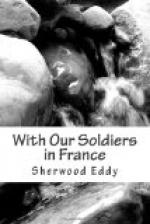To minister to these 60,000 men who daily crowd these thirty huts, there are 167 workers sent over from England, 100 of them men and 67 of them women. The latter are nearly all self-supporting and not only receive no salary but pay all their own expenses. The self-sacrificing toil of these helpers, who form part of a vast army of 30,000 heroic women who are voluntarily serving without compensation in the Associations of England and France, is beyond all praise. Their very presence in the camps is the greatest single moral factor for the creation of that indefinable atmosphere which pervades every hut. Even rude and coarse men never think of swearing or speaking an indecent word within these walls. Nor do they forget to be grateful for the tireless service of these women, who stand for hours day and night serving them and providing for their physical necessities. The women workers are under the direction of Lady Rodney, who has had four sons fighting at the front, one of whom has already fallen in action. The men have been thrilled and moved to the depths as Lady Rodney has addressed them on “What Are We Fighting For?” and by her message to the men from the women at home. Several hundred of the choicest women of America will be needed for service among our own troops. They should be women who can stand for the whole principle of the red triangle. They must be ready for tireless and exhausting physical service, able to work with others without friction, prepared to meet the social needs of the men and to give a sympathetic hearing to the tales that will be poured into their ears, but above all they must be able to give a definite Christian message to men fiercely tempted and beset by doubts and difficulties. The soldier cannot live by bread alone, nor by the tea and coffee of a Y M C A counter; he needs God, and the friendship of good women, and the spirit of home which they carry with them.
The hundred men who are working in these thirty British huts are worthy of note. A score of them are clergymen, who have resigned their churches for the period of the war. Many others are well-known ministers, laymen, or professors who have come over for a period of several months of service. The list of the men who have been serving here contains many distinguished names. There is Professor Burkett, the New Testament scholar of Cambridge, in charge of one of the huts; Professor Bateson, the great biologist of Cambridge, who has been lecturing on his subject, and who was swept off his feet by the response which he received from the troops. He stated that he was able to learn more from these men than in months of research in his laboratory, where he had been shut up for most of his life. Professor Holland Rose, also of Cambridge, has been lecturing to the troops on European history, interpreting the war to the soldier. Professor Oman, of the same university, has been dealing in his lectures with the historical problems of the war. Rev. E. A. Burroughs,




